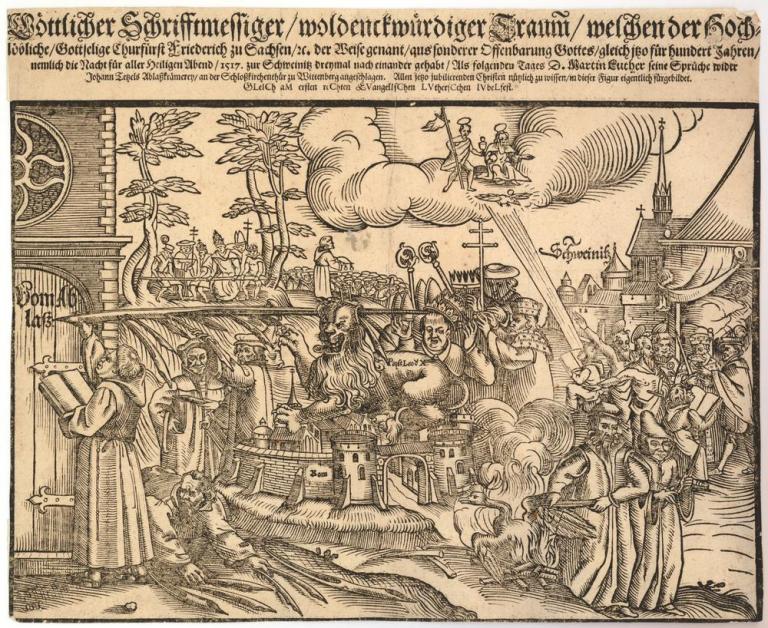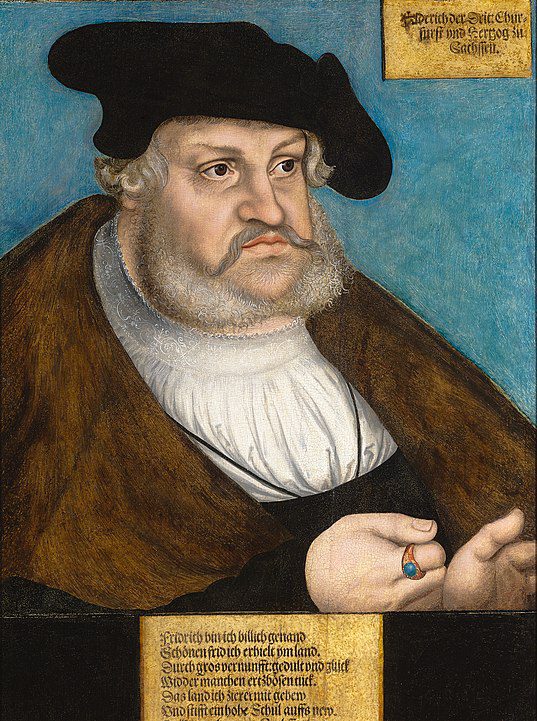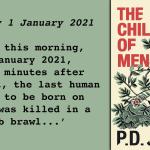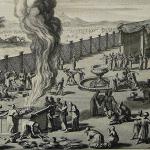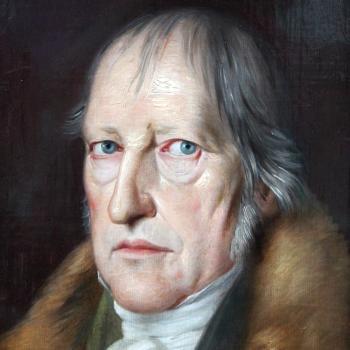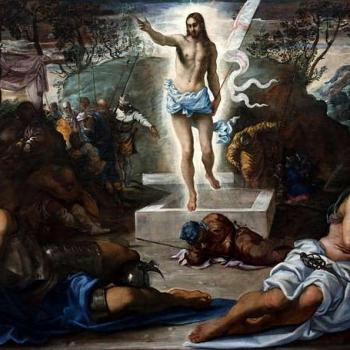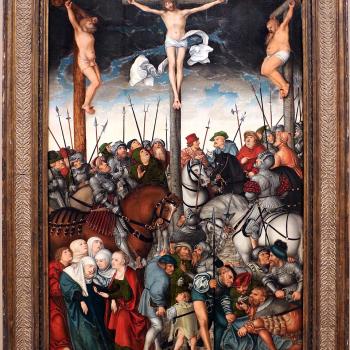I illustrated my recent post The Political Influence of the Reformation with a 17th century painting entitled “The Dream of Frederic the Wise of Saxony” by Jan Barentsz. It depicted a dream that the Elector supposedly had the night before Luther posted his theses, in which a monk writes something on the door of the Castle Church with a quill that reaches all the way to Rome, where it threatened to knock off the pope’s tiara.
I had never heard of that before, so I dug deeper. The story sounds like a legend, if not Reformation propaganda, but I was curious where it came from.
I found the account of the dream discussed and translated at The Red Brick Parsonage, a wonderful site in which Rev. Nathaniel J. Biebert offers “translations for confessional Lutherans.”
He says that the dream, which became a popular subject for woodcuts in the 17th century, indeed sounds apocryphal. But it can be traced, though indirectly and at third hand, to the Elector’s court.
And, if the account of the dream is in any way accurate, it would help solve one of the biggest mysteries of the Reformation: Duke Frederick was known as an exceptionally devout adherent of the Church of Rome, who owned one of the biggest collections of relics in Christendom, the veneration of which could earn pilgrims (who also paid a fee) thousands of years of indulgences. So why did this loyal son of the Church support and protect Luther?
Rev. Biebert traces the provenance of the earliest account of the dream, a manuscript in Dresden, which is a 1591 copy of a manuscript by Anton Musa (c. 1485–1547), who testifies that he heard the story from George Spalatin (1484–1545), the Elector’s advisor who became a close friend of Luther, who, in turn, heard it directly from Frederick.
I urge you to read Rev. Biebert’s translation of the manuscript in its entirety. Frederick is telling about his dream to his brother (who would succeed him, the fervently Lutheran John the Steadfast), asking him what it could possibly mean, if anything. He describes going to sleep, waking up with thoughts of All Saints’ Day and praying for the “dear souls” in purgatory, then falling to sleep again.
“Then I dreamed that the almighty God was sending a monk to me with a nice, honest face, who was the natural son of St. Paul, the dear apostle. He was accompanied, at God’s command, by all the dear saints, who were supposed to vouch for the monk before me that there was no deceit in him, but that he was truly an ambassador of God. God told them to instruct me to allow the monk to write something for me on my Castle Church in Wittenberg; I would not regret it. So I sent him word through the chancellor, saying that since God was telling me to do this, and since he was so powerfully vouched for, he could write what had been entrusted to him. Then the monk started to write, and his writing was so large that I could make it out here in Schweinitz. He was also using such a long quill pen that the back part of it reached all the way to Rome, and its shaft stabbed a lion who was lying in Rome in one of his ears, so that the shaft came back out through his other ear. The quill extended further all the way to the Papal Holiness’s tiara, and it knocked against it so hard that it began to wobble and was about to fall from His Holiness’s head. So as it was falling—I think I and Your Dearness were not standing too far away—I reached out my hand and tried to help steady it. Right when I was quickly grabbing hold of it, I woke up, and I was still holding my arm in the air.
Says Frederick, “I was completely terrified and at the same time angry at the monk for not exercising more restraint with his pen when writing.” He goes to sleep again, and the dream recurs, with additions. This time the quill “caused the lion to roar so dreadfully that the entire city of Rome and all the estates of the Holy Roman Empire came running to see what was going on. And then the Papal Holiness demanded of the estates that the monk be restrained, and especially that I be informed of this outrage.”
Frederick woke up and “prayed that God would guard the Papal Holiness from all evil.” Then the dream recurred for a third time. He described trying to break the quill. “But the more we tried to get at the quill, the more rigid it became.” Then the dreaming Duke tries to find out what is going on. “Nevertheless I had someone ask the monk (for at one moment I was in Rome, in Wittenberg the next) how he had come into the possession of such a feather, and how it happened to be so tough and firm? He relayed to me that it was from an old, hundred-year-old Bohemian goose.” That is a clear reference to the proto-Reformer John Hus, whose last name means “goose” in Czech!
Then more quills started appearing. “Many countless other quills had grown out of the monk’s long quill here in Wittenberg, and it was entertaining to watch as many scholars were scrambling to get them, with some of them thinking that these fresh, new quills would in time become just as large and long as this monk’s quill, and that something special would certainly happen as a result of this monk and his long quill.”
OK, the reference to Hus and the other quills might seem a little fishy. But the account is certainly dreamlike, as in the odd shifts and Frederick saying he was in Rome one moment and Wittenberg the next. That sort of thing happens in dreams, but not so much in literary allegories presented as dreams.
And it falls short as propaganda. Frederick is not presented as a hero of the Reformation, but as someone who prays for the souls in Purgatory and who seeks to defend the Pope against this monk and his quill. John the Steadfast says that the dream probably doesn’t mean anything. And there is no mention of the dream coming true the next day, when an actual monk writes an actual text on the door of Castle Church, which sets off a chain of events that does reach to Rome and unsettles the Pope’s authority.
So did Frederick the Wise really dream this and recognize that it was coming true with Luther? And did he consider the dream a sign from God, causing him to side with this monk with the formidable pen? Luther would surely have pointed the Elector to the Word of God, not to dreams, as the means of discerning God’s will. But attending to a dream would not have been that unusual for a medieval Catholic, a loyal son of Rome. Maybe God made an exception in reaching the Elector in this way.
As Rev. Biebert says, “Some act of special, divine intervention is almost required in order to understand why this otherwise loyal Catholic prince went out of his way to protect a subject who caused him so many headaches.”
Illustrations: Anonymous, Elector Frederick the Wise of Saxony’s Dream in Schweinitz on October 31, 1517, 1717, woodcut, via Red Brick Parsonage, Public Domain.
Portrait of Frederick the Wise by Lucas Cranach the Elder – https://www.artsy.net/artwork/lucas-cranach-the-elder-portrait-of-frederick-the-wise, Public Domain, https://commons.wikimedia.org/w/index.php?curid=74870924


